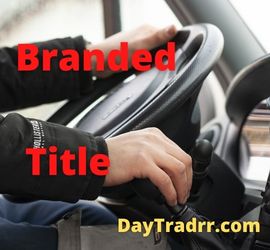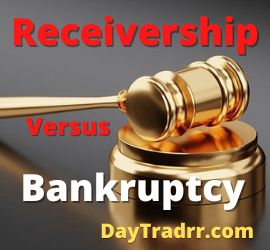What Is a Branded Title Auto?
 A branded title identifies a vehicle that has sustained damage due to causes like accidents, flooding, odometer tampering, etc. Once a brand has been assigned to a car’s title, it cannot be removed by repair, no matter how thorough. A branded title indicates that the car had extensive damage, issues with its odometer, or a defect that caused it to be bought back by the manufacturer. An automobile with a branded title isn’t always a totally negative thing. Branded title automobiles need more investigation and research than new or clear title vehicles. However, with a trustworthy vendor and a high-quality repair, it might still be a solid value.
A branded title identifies a vehicle that has sustained damage due to causes like accidents, flooding, odometer tampering, etc. Once a brand has been assigned to a car’s title, it cannot be removed by repair, no matter how thorough. A branded title indicates that the car had extensive damage, issues with its odometer, or a defect that caused it to be bought back by the manufacturer. An automobile with a branded title isn’t always a totally negative thing. Branded title automobiles need more investigation and research than new or clear title vehicles. However, with a trustworthy vendor and a high-quality repair, it might still be a solid value.
Specific title brands depend on the car’s condition and the state where the label was attached. Only a state official can assign a branded title to a vehicle and register it in its documents. Check with your local Division of Motor Vehicles for state-specific information. Buying a secondhand automobile might be cost-effective, but it is not without potential risks. For safety reasons, always review all relevant documents to ensure the vehicle’s history. The title brand indicates whether or not the car is possibly hazardous to drive. If you want to buy a used car, it is critical that you understand what it means. A branded title implies that the vehicle had substantial damage, manipulation of its odometer, or a flaw that led the manufacturer to buy it back. A car with a branded title can be a terrific value, but there are several negatives that may make the transaction unappealing.
Branded Title – Label Categories
Used automobiles may have appealingly low prices. However, before making a purchase, make sure you understand the vehicle’s features, owner history, and potential damage. A branded title stays in effect for the life of the vehicle. Even if the automobile is flawlessly fixed, the branded title label cannot be eliminated. Branded titles are treated differently depending on which state attaches the label. In general, they are divided into a few common categories:
Lemon Title Brand
Lemon title automobiles have serious recurring flaws that necessitate the makers to buy them back. Typically, such problems render the vehicle hazardous or potentially unusable. Even after several attempts to repair it over a lengthy period of time of 30 days or more. Manufacturers are required by law to buy back damaged cars or replace them with new ones. However, each state has distinct standards when attaching this designation to a vehicle. Some localities in the United States do not have a lemon law at all. Other locations apply it even if the automobile has previously been resold to a new buyer by its initial owner, and even if the car has been resold many times.
Altered odometer title brand
A car’s mileage impacts its value. Therefore, jurisdictions require odometer readings when a vehicle is registered. When automobiles are brought to a repair, their odometer readings are usually recorded. Still, odometer readings aren’t always correct. According to the National Highway Traffic Safety Administration, more than 450,000 automobiles are sold each year with incorrect odometer readings. If evidence indicates an odometer shows fewer miles than the automobile really traveled, the title will say “altered odometer” or “odometer rollback.” Even competent mechanics can have a tough time accurately detecting odometer rollback.
Committing odometer fraud is a crime. The federal government passed a law that requires a written disclosure of the mileage registered on an odometer to be provided on the title by the seller to the purchaser when the ownership of a vehicle is transferred. If the odometer mileage is incorrect, the law requires a statement to that effect to be furnished on the title to the buyer. However, a vehicle is exempt from the written disclosure requirements if it’s 20 years old or older, or a model year 2010 vehicle or older. Digital odometers that have been tampered with are even harder to detect than traditional mechanical odometers (since they have no visible moving parts). A vehicle’s condition and a detailed history report are the best clues a buyer has for determining whether fraud has occurred. (Source: nhtsa.gov)
Reconstructed or rebuild title brand
Automobiles are sometimes deemed a total loss after an accident. However, the insurance company may sell the vehicle at auction to try to recuperate some of its losses. The automobile may then be purchased by a repair business, which may attempt to repair and resell the vehicle. Following these repairs, the vehicle must pass a safety assessment before it may be used. If it passes, the state will give a branded title with a rebuilt or reconstructed label to the car. The title informs potential buyers that the vehicle was damaged and repaired. The designation notifies potential buyers that the vehicle’s structural or mechanical integrity may have been compromised.
Not all vendors invest in high-quality repairs. This may result in additional expenditures or possibly the need to entirely redo the reconstruction in the future. Ultimately, it may result in a larger future investment in the best-case scenario. However, it could result in an accident, injury, or even death in the worst-case scenario. As a result, rebuilt title automobiles should be approached with utmost caution.
Salvage title brand
An automobile with a salvage title was involved in an accident and deemed a total loss. Insurance companies calculate the cost of repairs plus the scrap value of the vehicle when deciding to repair or scrap. The automobile will be considered a total loss if the necessary repairs and scrap value exceed a specified proportion of the car’s worth. This value can vary by state. If the insurance company determines that the vehicle is a total loss, a salvage branded title is attached.
A salvage title brand establishes that the cost of automobile repair is 50% or more of the selling price. It most often applies to vehicles that have been in a serious accident. Cars with salvage title brands account for 75-85 percent of all automobiles sold at American auctions. Such vehicles can be driven in the United States subject to a rebuilt title or exported to foreign nations. In certain areas, the cost of repairs may be limited to 75% of the original cost. In general, a salvage title brand indicates that the automobile was involved in a serious accident. The insurance company determined that the damage was greater than 50% of the car’s cost. As a result, it was not worth repairing and the insurer reimburses the owner for the car’s market value. The insurance company then deducts any relevant fees, and the vehicle is auctioned off.
Water damage title brand
This label is given to a vehicle that has been damaged by natural catastrophes. For example, flooding, hurricanes, excessive rain, or the automobile was in the middle of a calamity. If the car is completely submerged in water, serious damage to the engine and electronics is unavoidable. It is not advisable to purchase such a vehicle. In less extreme cases, an automobile may become stuck amid severe rain. Or, the driver may have left the windows open, allowing water to enter the vehicle. In any case, car owners are usually compensated and their automobiles are auctioned off. Buying secondhand water-damaged cars is a risky enterprise. At the very least, it should be inspected by impartial specialists. They will perform a thorough examination of the vehicle and report on the extent of water damage. Water can cause interior damage, mold and mildew growth, and engine damage.
Pros and Cons of Branded Titles
An automobile with a branded title may appear flawless and perform well, and purchasing one may be appealing. But, before you hand over your hard-earned cash, consider the following benefits and disadvantages:
Pros
- Discounted pricing – A car with a branded title may be the answer if you’re on a tight budget and seeking low-cost transportation. Vehicles with branded titles may cost half the price of a comparable vehicle with a clean title.
- A newer vehicle – You may be able to secure a newer model by acquiring a branded title automobile. Or, you can obtain a car with more features than you would be able to afford otherwise.
Cons
- Resale – Issues may arise while reselling your branded title vehicle. Buyers may be wary of a car with a branded title, and the stigma may reduce the resale value.
- Financing – A car loan may be difficult to obtain. Many lenders will only fund vehicles that have clear titles. If the vehicle you want has a branded title, you may have to hunt around for a car loan. Also, you may face a higher interest rate.
- Insurance – You may have difficulty finding an insurer. Not all insurance companies will cover vehicles with branded titles, you may need to look around for coverage.
- Hidden mechanical problems – You’re taking a risk by purchasing a car with a branded title. A car with substantial damage or other faults may be unreliable. You may find yourself paying for costly repairs.
How to Find Out If a Car Has a Branded Title
The National Insurance Crime Bureau (NICB) has access to a database of stolen automobiles. These vehicles have either not been recovered or declared salvage in the last five years. This information is being made accessible to users for free as a public service. The data in VINCheck pertains to automobiles insured in the United States. This database comprises two files: a “salvage” file and an “insurance theft” file, which VINCheck scans for during queries. In the insurance market, the words “total loss” and “salvage” are not synonymous. This distinction is vital to remember while utilizing VINCheck. Not all automobiles declared a total loss will be salvaged. Specific insurance firms make salvage determinations based on individual business rules and applicable state law.
VINCheck is a free lookup service offered to the public. It assists in determining whether a vehicle has a record of an insurance theft claim and has not been recovered. Or, has ever been reported as a salvage vehicle by participating NICB member insurance companies. A vehicle identifying number (VIN) is required to make a lookup. Per IP address, a maximum of five searches can be performed in a 24-hour period.
Frequently Asked Questions
Is a branded title the same as salvage?
Why are branded titles bad?
What are the risks of buying a car with a branded title?
Up Next: Fresh Start Program – How To Start Over with the IRS
 The IRS Fresh Start Program offers debt offers relief options to delinquent taxpayers. The program makes it easier for taxpayers to pay off significant tax debt and penalties legally. Taxpayers who are unable to pay their Internal Revenue Service (IRS) debts often find themselves in a tough situation. There are some filers who legitimately believe they do not owe the amount of tax imposed on them. These can seek relief from the IRS’s Taxpayer Advocate Service or the Appeals Division. Unfortunately, some difficult situations can only be addressed in tax court. However, those who actually owe past taxes to the IRS, will suffer interest, penalties, and eventually liens and levies against their state tax refunds, income, and property.
The IRS Fresh Start Program offers debt offers relief options to delinquent taxpayers. The program makes it easier for taxpayers to pay off significant tax debt and penalties legally. Taxpayers who are unable to pay their Internal Revenue Service (IRS) debts often find themselves in a tough situation. There are some filers who legitimately believe they do not owe the amount of tax imposed on them. These can seek relief from the IRS’s Taxpayer Advocate Service or the Appeals Division. Unfortunately, some difficult situations can only be addressed in tax court. However, those who actually owe past taxes to the IRS, will suffer interest, penalties, and eventually liens and levies against their state tax refunds, income, and property.
With tax debt, it is more difficult to secure or retain a job, or to receive affordable credit of any type. Many tax professionals and consumer activists have criticized the IRS for failing to help consumers to pay their taxes. There are many taxpayers that acknowledge their tax debt, but cannot currently pay it, for whatever reason. In response, the IRS announced the development of a new project called as the Fresh Start program in 2011. This program allows individuals who owe significant past taxes to combine their tax bills. Further, they can propose repayment schedules to pay their tax debts in a simple and orderly manner.




